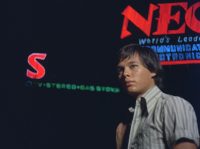
Newsletter April 2018

It is now 50 years since the revolutionary year 1968, which has in the interim become a symbol of social change. For Fassbinder 1968 was a phase of transition. He had already shot short films such as THE CITY TRAMP (1965) and THE LITTLE CHAOS (1966) but was yet to make his first feature film, LOVE IS COLDER THAN DEATH (1969). It was in 1968 that the action-theater, which RWF had joined in 1967, disbanded, which in turn led to the formation of the legendary antiteater. The latter’s first productions included classics such as Goethe’s “Iphigenia in Tauris” and Sophocles’ “Ajax” as well as the first staging of “The American Soldier,” which Fassbinder adapted for the screen two years later.
The film’s cast included antiteater cofounder and ensemble member Kurt Raab, who is remembered by the author and journalist Heribert Prantl in his recent column for the Süddeutsche Zeitung. Prantl writes of his youth in the eastern Bavarian town of Nittenau, where to the 14-year-old the upheavals of 1968 seemed like images from another world. Kurt Raab’s mother lived in the same town and she invited Prantl over to her house while her son was visiting during the summer holidays:
“We sat in her small apartment, the strangest aspect of which was a stovepipe that ran across the eat-in kitchen – it was like something out of the film “Why Does Herr R. Run Amok?” […] This man, about whom I only knew that he was an actor and the son of “old lady Raab,” sat next to me but I was too shy to say anything. Realizing this, Raab began to talk about theater, about the rebellion of the young against the old, about the revolution and the intolerability of the current state of affairs in German society, about Rosa von Praunheim and Rainer Werner Fassbinder. I didn’t understand much about what he was saying and so I suggested we go to the town’s outdoor swimming pool, which we did. On the way we passed the local cinema, the Lichtspieltheater Haider. I can’t remember the name of the film that was showing but only that Kurt Raab said something that included the word ‘crap’.”
The complete article is available on the website of the Süddeutsche Zeitung: http://www.sueddeutsche.de/politik/prantls-blick-wie-der-aufruhr-in-die-provinz-kam-1.3936197
As already mentioned in our last newsletter, until 16 May the Cinémathèque française in Paris is screening a complete Fassbinder retrospective (more information is available at: http://www.cinematheque.fr/cycle/rainer-werner-fassbinder-439.html). Parallel to this event our cooperating partner of many years Carlotta Films is touring 14 of RWF’s films made between 1969 and 1981, which are being screened in new 4K restorations. There will be further screenings in summer and autumn. In addition the films have been available for purchase as a two-disc Blu-ray box-set since 18 April. More information about the retrospectives, the Blu-rays and the French release of EIGHT HOURS DON’T MAKE A DAY (1972) can be found on the distributor’s website (http://carlottavod.com) and an article about the current Fassbinder events has been published in the newspaper Le Monde: http://www.lemonde.fr/culture/article/2018/04/18/fassbinder-cineaste-du-fard-et-de-l-artifice_5286798_3246.html
The significance of Filipino director Lino Brocka for his country’s film industry is similar to Fassbinder’s for film in Germany. There are many parallels between the two filmmakers: intense productivity, a belief in the socially critical potential of the melodrama, an aggressive political approach and not least a life cut far too short. However, even almost 30 years after his death Brocka is scarcely known outside the Philippines. Until recently not a single one of his over 60 films was available in DVD in the West. In 2013 his film MANILA IN THE CLAWS OF LIGHT (1975) was finally screened at the Cannes Film Festival, after undergoing digital restoration by the Film Foundation. The film is regarded not only as Brocka’s magnum opus but also as one of the best Philippine films ever made.
The film tells the story of Julio, a young man from a provincial backwater who travels to Manila in search of his missing sweetheart. There he finds himself dealing with a world in which exploitation in the form of illegal work and forced prostitution is the norm and which threatens to destroy him. A year ago the British Film Institute brought out a 2-disc DVD/Blu-ray edition that includes not only MANILA IN THE CLAWS OF LIGHT but also INSIANG (1976), another of Brocka’s major works (the DVD can be purchased at: http://shop.bfi.org.uk/dvd-blu-ray/http-shop-bfi-org-uk-dvd-blu-ray-lino-brocka-two-films.html).On 12 June the film is also being released by the American distributor Criterion Collection (for more information see: https://www.criterion.com/films/29221-manila-in-the-claws-of-light).
We wish our friends and readers a wonderful spring and will be back in May with more news from the world of Rainer Werner Fassbinder.
Photo left: Kurt Raab and Karl Heinz Vosgerau in WORLD ON A WIRE © Rainer Werner Fassbinder Foundation
Photo right: Manila in the Claws of Light © Cinema Artists